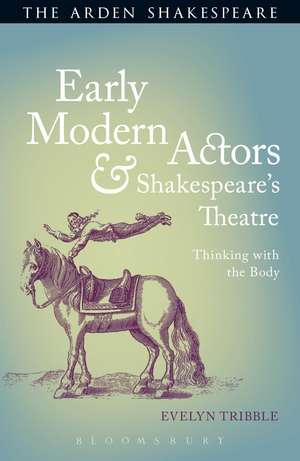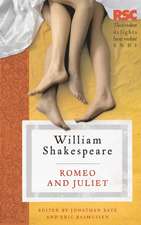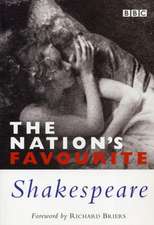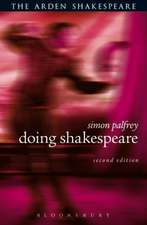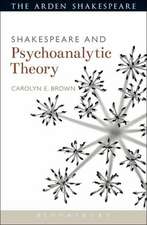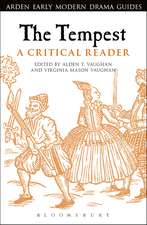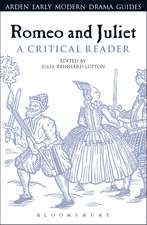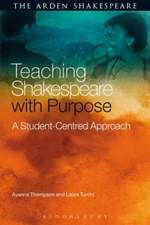Early Modern Actors and Shakespeare's Theatre: Thinking with the Body
Autor Prof Evelyn Tribbleen Limba Engleză Paperback – 17 apr 2019
| Toate formatele și edițiile | Preț | Express |
|---|---|---|
| Paperback (1) | 170.50 lei 3-5 săpt. | +39.33 lei 4-10 zile |
| Bloomsbury Publishing – 17 apr 2019 | 170.50 lei 3-5 săpt. | +39.33 lei 4-10 zile |
| Hardback (1) | 653.61 lei 6-8 săpt. | |
| Bloomsbury Publishing – 22 feb 2017 | 653.61 lei 6-8 săpt. |
Preț: 170.50 lei
Preț vechi: 198.89 lei
-14% Nou
Puncte Express: 256
Preț estimativ în valută:
32.63€ • 33.94$ • 26.94£
32.63€ • 33.94$ • 26.94£
Carte disponibilă
Livrare economică 24 martie-07 aprilie
Livrare express 07-13 martie pentru 49.32 lei
Preluare comenzi: 021 569.72.76
Specificații
ISBN-13: 9781472576026
ISBN-10: 1472576020
Pagini: 240
Ilustrații: 10 bw illus
Dimensiuni: 129 x 198 x 19 mm
Greutate: 0.25 kg
Editura: Bloomsbury Publishing
Colecția The Arden Shakespeare
Locul publicării:London, United Kingdom
ISBN-10: 1472576020
Pagini: 240
Ilustrații: 10 bw illus
Dimensiuni: 129 x 198 x 19 mm
Greutate: 0.25 kg
Editura: Bloomsbury Publishing
Colecția The Arden Shakespeare
Locul publicării:London, United Kingdom
Caracteristici
Offers new readings of many key plays using an innovative new methodology. In particular, it examines two plays that are often parsed for character and theme - Hamlet and The Jew of Malta - and argues that both can be re-read as plays preoccupied with skill display.
Notă biografică
Evelyn Tribble is Donald Collie Chair and Professor of English at the University of Otago, Dunedin, New Zealand.
Cuprins
Chapter 1: Mindful Bodies: Skill Ecologies in Early modern EnglandChapter 2: Opening Simon Jewell's Box: The Player's ToolkitChapter 3: 'Skill of weapon' Chapter 4: Dancing, Music, and SongChapter 5: The Skill Behind the Skills: Elocution, Memory, 'Vigilancy,' and 'Pregnancy of Wit'Chapter 6: Conclusion: Reading Through the Lens of SkillBibliography; Index
Recenzii
As a work of theatre history, Early Modern Actors and Shakespeare's Theatre is a compelling introduction to the breadth and depth of players' practices. Its concise and direct prose renders difficult historical and scientific concepts simple to navigate, if not easy to resolve. The text is efficient and fluent, demonstrating its claims using an extensive collection of brief but cogent readings, which it prefers to lengthier, closer interpretations of a given playtext. This invigorating book offers a model for more sustained academic engagement with acting as both historical practice and contemporary craft. As such, it amply serves both researchers and practitioners invested in early modern stage action.
Tribble (Univ. of Otago, New Zealand) has written a study that will be of great use to those interested in Shakespeare or English Renaissance drama. As the subtitle infers, the volume engages the idea of the specific skills Renaissance actors needed in order to perform, and how they differ from the skills of contemporary actors. The author devotes chapters to dance, stage combat and fighting, improvisation and wit, and gesture and movement. Drawing on scripts, contemporaneous accounts, and the work of other scholars, Tribble is convincing in framing her contentions and constructing the notion of "mindful bodies" of actors trained to perform dances and fights for an audience knowledgeable about such practices. In the introduction the author contextualizes the book in the larger body of scholarship on Renaissance performance practice, the theoretical framing of skills, and the examination of kinesic intelligence on reconstructed stages. A conclusion focuses on how re-creation of "original performances" is often disappointing to contemporary audiences, who are not used to such practices and whose expectations are not trained by film and television. This volume will valuable to the scholar, but even more valuable to contemporary artists who perform Renaissance drama. Summing Up: Highly recommended. Lower-division undergraduates through faculty and professionals.
Early Modern Actors and Shakespeare's Theatre flips a critical switch and reminds us that we are constantly reading each other's bodies, and that we continually struggle to control our own . I look forward to deploying Tribble's appealing, lucid prose in my own classroom, and using her work to encourage students to think 'with the body' when?launching their own interpretations. It's worth noting how effortless Tribble makes rather sophisticated intellectual labor appear. Throughout her writings, she demonstrates exhaustive knowledge not only of early modern theater and culture, but also cites studies from cognitive science, sociology, anthropology, and dance-really, anything that might be helpful to our understanding. This interdisciplinary, resourceful, and imaginative pursuit of a largely absent target synthesizes a wealth of thinking. It models what can only be described as profoundly skillful scholarship.
Evelyn Tribble is one of the foremost scholars of early modern acting working today . This detailed study of the physical and cognitive demands of the early modern playhouse sheds new light on the skills possessed by the first performers of plays by Shakespeare and his contemporaries. Situating early modern actors in a "distributed cognitive ecology" markedly different from that inhabited by actors today, Tribble offers sensitive and well-historicized considerations of, on the one hand, the physical skills required of players and remarked upon by playgoers (gesture, movement, dance, swordplay) and, on the other, "the skills behind the skills": qualities such as wit and variety which, while not visible or tangible, were paramount to successful and memorable performance. In doing so, she provides inventive-and often brilliant-re-readings of early modern plays from the ultra-canonical to the most neglected. A masterful bridging of texts and disciplines, the work is important-even essential-reading for any early modern performance scholar . The book offers a new and exciting framework for the study of even the best-known plays. It can only be hoped that future scholars will continue, so inventively, to bring early modern actors center stage.
An impressive piece of scholarship . Each chapter is expertly researched and heavily annotated. Tribble plumbs various sources to piece together a contemporary understanding of each performance-related skill, thoroughly contextualizing each point.
Tribble (Univ. of Otago, New Zealand) has written a study that will be of great use to those interested in Shakespeare or English Renaissance drama. As the subtitle infers, the volume engages the idea of the specific skills Renaissance actors needed in order to perform, and how they differ from the skills of contemporary actors. The author devotes chapters to dance, stage combat and fighting, improvisation and wit, and gesture and movement. Drawing on scripts, contemporaneous accounts, and the work of other scholars, Tribble is convincing in framing her contentions and constructing the notion of "mindful bodies" of actors trained to perform dances and fights for an audience knowledgeable about such practices. In the introduction the author contextualizes the book in the larger body of scholarship on Renaissance performance practice, the theoretical framing of skills, and the examination of kinesic intelligence on reconstructed stages. A conclusion focuses on how re-creation of "original performances" is often disappointing to contemporary audiences, who are not used to such practices and whose expectations are not trained by film and television. This volume will valuable to the scholar, but even more valuable to contemporary artists who perform Renaissance drama. Summing Up: Highly recommended. Lower-division undergraduates through faculty and professionals.
Early Modern Actors and Shakespeare's Theatre flips a critical switch and reminds us that we are constantly reading each other's bodies, and that we continually struggle to control our own . I look forward to deploying Tribble's appealing, lucid prose in my own classroom, and using her work to encourage students to think 'with the body' when?launching their own interpretations. It's worth noting how effortless Tribble makes rather sophisticated intellectual labor appear. Throughout her writings, she demonstrates exhaustive knowledge not only of early modern theater and culture, but also cites studies from cognitive science, sociology, anthropology, and dance-really, anything that might be helpful to our understanding. This interdisciplinary, resourceful, and imaginative pursuit of a largely absent target synthesizes a wealth of thinking. It models what can only be described as profoundly skillful scholarship.
Evelyn Tribble is one of the foremost scholars of early modern acting working today . This detailed study of the physical and cognitive demands of the early modern playhouse sheds new light on the skills possessed by the first performers of plays by Shakespeare and his contemporaries. Situating early modern actors in a "distributed cognitive ecology" markedly different from that inhabited by actors today, Tribble offers sensitive and well-historicized considerations of, on the one hand, the physical skills required of players and remarked upon by playgoers (gesture, movement, dance, swordplay) and, on the other, "the skills behind the skills": qualities such as wit and variety which, while not visible or tangible, were paramount to successful and memorable performance. In doing so, she provides inventive-and often brilliant-re-readings of early modern plays from the ultra-canonical to the most neglected. A masterful bridging of texts and disciplines, the work is important-even essential-reading for any early modern performance scholar . The book offers a new and exciting framework for the study of even the best-known plays. It can only be hoped that future scholars will continue, so inventively, to bring early modern actors center stage.
An impressive piece of scholarship . Each chapter is expertly researched and heavily annotated. Tribble plumbs various sources to piece together a contemporary understanding of each performance-related skill, thoroughly contextualizing each point.
